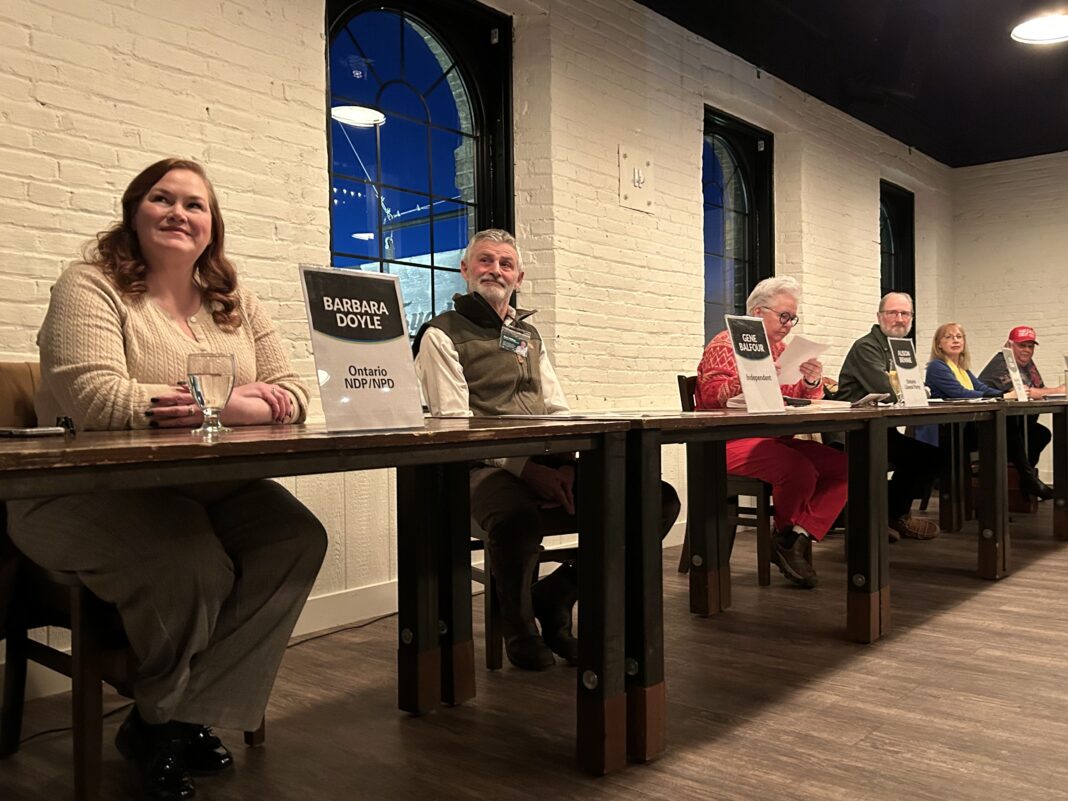A Feb. 19 candidates debate in Lindsay was an all-business affair, with six of the nine provincial hopefuls in Haliburton-Kawartha Lakes-Brock (HKLB) discussing plans to bolster the economy.
Gene Balfour (Independent), Jacquie Barker (New Blue), Alison Bennie (Liberal), Barbara Doyle (NDP), Bill Denby (Freedom), and Tom Regina (Green) shared their platforms and answered questions posed by the public.
The event was hosted by the Lindsay District Chamber of Commerce and Lindsay Downtown BIA, with approximately 150 people attending.
Asked about protecting small businesses should U.S. president Donald Trump push forward with 25 per cent tariffs on most Canadian imports, Regina said the Greens will create a ‘Protect Ontario’ fund to assist those “disproportionately impacted.
“Creating a tariff taskforce working across party and jurisdictional lines to negotiate with the U.S.,” Regina said. “We have to create an investment tax credit to unlock business investments here, develop a ‘buy Ontario’ strategy and implement public procurement supports.”
Doyle said the NDP’s would also provide “structured assistance” to some industries, though felt the tariffs present an opportunity for Canada to become more self-sufficient.
“In our riding, we have room for growth. We can go after new industries – there are lots of people facing layoffs in the U.S… they’re looking for somewhere to go. Why not here? We can go after manufacturing and bring business to our area,” Doyle said.
Balfour, a long-time advocate for less government oversight, said tariffs will provide entrepreneurs the opportunity to reimagine their business models; Bennie said she was in favour of a “coordinated response” to fight back, feeling Liberal leader Bonnie Crombie can “stand up to Trump.”
Denby and Barker believe the best response is finding a way to appease Trump to avoid tariffs being implemented.
When asked what their parties would do to drive more business to Kawartha Lakes and Haliburton County, Doyle said investing in housing and public transportation, to make the area more attractive to large-scale industry and manufacturers, was a top priority.
Bennie said the Liberals would cut taxes for small businesses, freeing up capital to expand; Regina noted the Greens would target “the $2 trillion clean economy” – for renewable energy technology, electric vehicles and low-carbon solutions aimed at combating climate change – taking advantage of the province’s natural resources and geography to become a global leader; with Denby also calling for more local manufacturing.
Barker said the New Blues would reduce the provincial sales tax from 13 to 10 per cent, with a long-term goal of scrapping it. She also wants to eliminate the provincial carbon tax, which she feels is to blame for some Ontario-based industries relocating elsewhere.
“It targets large manufacturing sectors like auto plants, steel mills, cement makers, chemical plants, and oil refineries. These companies are required to pay compliance incentives to the government, and it will cost them over $2 billion by 2030, so guess where our industries are going, to [other countries that] don’t charge,” Barker said.
All candidates other than Barker, who said the New Blues don’t have a policy addressing it, supported removing provincial barriers for free trade.
Quizzed on finding ways to improve childcare options and affordability for parents who want to return to work, Balfour and Denby said they would find efficiencies in “non-essential” government sectors to fund more local centres.
“We need to downsize government, do an internal audit at Queen’s Park. I bet we can save billions that would totally fund a childcare program for people,” Denby said.
Regina said the Greens would increase wages for childcare workers, making the job more attractive to ensure facilities are adequately staffed; Doyle said the NDP would support the federal government’s plan for $10-a-day daycare; while Barker said offering tax breaks and other supports would enable people to stay home and care for their children longer.
Commenting on the dismal voter turnout in 2022, Regina said all parties and prospective politicians play a key role in getting more people engaged in politics.
“We’ve got a bunch of grandmas and grandpas up here on stage, talking to a bunch of grandmas and grandpas in the audience… we don’t have enough voices at the table,” Regina said. “We need to think differently, find ways to get people on board… this is time for electoral reform… it’s not right that 18 per cent of the voters can give 60 per cent of seats to a party that will have 100 per cent of legislative power.”





